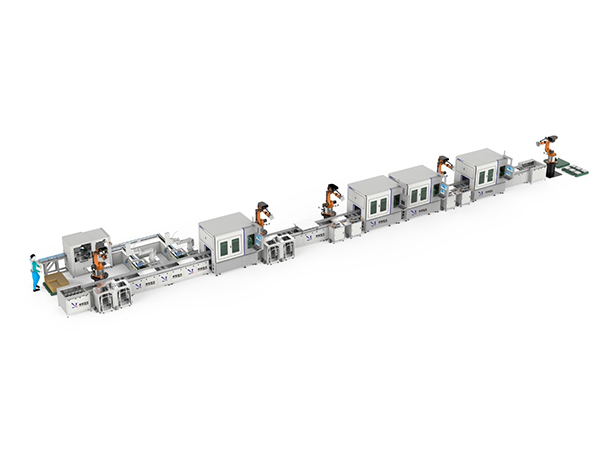Turnkey Solution for New Energy Intelligent Equipment
Laser welding machines are widely used in the hardware industry for their precision, speed, and versatility. They offer numerous benefits over traditional welding methods, including reduced heat-affected zones, minimal distortion, and high-quality welds. Here are some key points about laser welding machines in the hardware industry:
Welding Applications: Laser welding machines are used for various applications in the hardware industry, such as joining metal components, welding fasteners, attaching hinges, welding brackets, and assembling complex hardware structures.
Precision and Control: Laser welding provides exceptional precision and control over the welding process. The focused laser beam allows for precise energy delivery to the weld area, resulting in consistent and accurate welds.
Versatility: Laser welding machines can weld a wide range of materials commonly used in the hardware industry, including stainless steel, aluminum, titanium, copper, and alloys. They can handle different thicknesses and configurations, making them suitable for various hardware components.
Speed and Efficiency: Laser welding is a fast process, enabling high production rates. The automated nature of laser welding machines further enhances efficiency, reducing labor costs and improving overall productivity.
Non-contact Welding: Laser welding is a non-contact welding process, meaning there is no direct physical contact between the laser and the workpiece. This eliminates the need for additional fixturing or clamping, allowing for easier handling of delicate or complex hardware components.
Clean and Aesthetic Welds: Laser welding produces clean and aesthetically pleasing welds with minimal spatter, eliminating the need for extensive post-welding finishing or cleaning processes. This is particularly important for hardware components that require a visually appealing appearance.
Weld Strength and Durability: Laser welding results in strong and durable welds, often exceeding the strength of the base material. This is crucial for hardware components that need to withstand significant loads or stress in their applications.
Weld Monitoring and Quality Control: Advanced laser welding machines incorporate real-time monitoring systems to ensure weld quality and detect any potential defects. These systems can measure parameters like temperature, energy input, and weld penetration, ensuring consistent quality throughout the production process.
Automation Integration: Laser welding machines can be easily integrated into automated production lines, allowing for seamless integration with other hardware manufacturing processes, such as CNC machining, assembly, or robotics.
When considering a laser welding machine for the hardware industry, factors such as power output, beam delivery options (fiber or CO2), automation capabilities, and the specific requirements of your hardware components should be taken into account. It's important to consult with suppliers or manufacturers of laser welding equipment to determine the most suitable machine for your specific needs.

EV Prismatic Battery Module PACK Assembly Line

EV Cylindrical Battery Module PACK Assembly Line

EV Pouch Battery Module PACK Line

EV Blade Battery Module PACK Line

EV Cylindrical Battery Module PACK Assembly Lines

Prismatic Battery Cap Manufacture Line

Cylindrical Battery Manufacture Line

Pouch Battery Module Pack Assembly Line

Email: yaolaser@huiyaolaser.com
Head Quarter Address: Huiyao Laser Technology, Building 2, Langxu Industrial Park, Guanlin Road, Science Park Street, Luolong District, Luoyang City, Henan Province, China
Research&Development Center: Room 901-9,Building B1, Phase 1, Southern Area, Baoneng Science and Technology Park, Qinghu Industrial Zone, Gangtou Community, Batian Street, Longgang District, Shenzhen City.